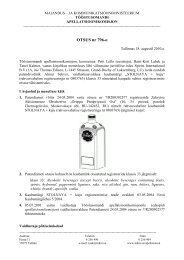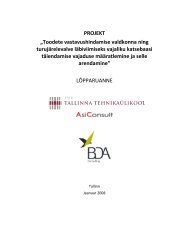Feasibility study for an Estonian Materials Technology Programme
Feasibility study for an Estonian Materials Technology Programme
Feasibility study for an Estonian Materials Technology Programme
You also want an ePaper? Increase the reach of your titles
YUMPU automatically turns print PDFs into web optimized ePapers that Google loves.
42<br />
<strong>Feasibility</strong> <strong>study</strong> <strong>for</strong> <strong>an</strong> Estoni<strong>an</strong> <strong>Materials</strong> <strong>Technology</strong> <strong>Programme</strong><br />
2. <strong>Materials</strong> technology in Estonia<br />
Recommendations <strong>for</strong> the plastics industry<br />
There is a clear need <strong>for</strong> higher added value products in the Estoni<strong>an</strong> plastic industry<br />
This calls <strong>for</strong> more collaboration between/within comp<strong>an</strong>ies <strong>an</strong>d universities<br />
Current subcontracting business models are making collaboration difficult<br />
Plastics are extremely import<strong>an</strong>t materials <strong>for</strong> the future<br />
Polymer composites <strong>for</strong> tr<strong>an</strong>sportation, construction <strong>an</strong>d machinery<br />
Plastic <strong>an</strong>d printed electronics (lighting, packaging, solar cells, ...)<br />
Packaging<br />
Interesting comp<strong>an</strong>ies<br />
Estiko Plastar, Nordbiochem<br />
And more concrete comments:<br />
Plastics industry would need <strong>an</strong> independent development centre.<br />
Universities are very much on the chemical side: how to bridge the gap with industry?<br />
Give some teaching about practical work <strong>an</strong>d internships<br />
The technology investments programme (EAS) was popular among plastic industry. The industry<br />
believes it should be restarted.<br />
Case: Estiko Plastar<br />
Background<br />
The comp<strong>an</strong>y was orginally established already in 1917, being a comb factory at the time. In 1991 the enterprise<br />
was registered as a public limited comp<strong>an</strong>y – Estiko Plastar AS. From that time the enterprise has been<br />
operating as one of the leading m<strong>an</strong>ufacturers of packaging materials in the Baltic region, also competing successfully<br />
in the local markets in Sc<strong>an</strong>dinavia, Russia, Irel<strong>an</strong>d <strong>an</strong>d other export markets. The comp<strong>an</strong>y currently<br />
employs around150 people.<br />
Th<strong>an</strong>ks to the modern flexographic printing presses, Estiko Plastar offers high quality solutions printed in up to<br />
eight colours <strong>for</strong> the packages of m<strong>an</strong>y food products. Clients include e.g.<br />
Milk industries: Packages <strong>for</strong> milk, yoghurt, sour cream, mayonnaise, ice-cream, <strong>an</strong>d cheese<br />
Meat <strong>an</strong>d fish industries: Packages <strong>for</strong> meat, sausage, dumplings, fish <strong>an</strong>d shrimp<br />
Confectioneries: Packages <strong>for</strong> c<strong>an</strong>dy, biscuits, chocolate <strong>an</strong>d bread.<br />
Their competive adv<strong>an</strong>tage compared to baltic competitors is better technology with its newly upgraded<br />
production, <strong>an</strong>d compared to nordic competitors is better price. Vision: To be the first choice as a producer of<br />
packages <strong>an</strong>d packaging materials in the target market.<br />
R&D<br />
From EstikoPlastar point of view basic<br />
R&D me<strong>an</strong>s product engineering, i.e.<br />
tailoring the products with properties<br />
according to customer needs.<br />
Exceptional on Estoni<strong>an</strong> scale, the owners have put ef<strong>for</strong>t into renewal of the comp<strong>an</strong>y through long term<br />
development by hiring <strong>an</strong> R&D project m<strong>an</strong>ager, Dr L<strong>an</strong>ge, who is <strong>an</strong> expert in the field of material science.<br />
Projects involve EU-projects, contract research from Estoni<strong>an</strong> universities <strong>an</strong>d typically have a time-scale of 2-5<br />
years. Dr L<strong>an</strong>ge does also technology scouting by e.g. attending international conferences in the area he is<br />
also responsible <strong>for</strong> all R&D related contacts <strong>an</strong>d networks in the comp<strong>an</strong>y. The aim is to increase the use of<br />
plastics through e.g. including electronics, <strong>an</strong>d be aware of the newest trends to be able to ch<strong>an</strong>ge production<br />
rapidly to <strong>an</strong>swer the dem<strong>an</strong>d of the markets.<br />
University-Comp<strong>an</strong>y collaboration<br />
Estiko Plastar is a partner in the Estoni<strong>an</strong> N<strong>an</strong>otechnology Competence Centre, where they are working<br />
together with Tartu University on developing plastic film properties, with the main objective to rein<strong>for</strong>ce the<br />
plastics with a minor doping of carbon n<strong>an</strong>omaterials. Collaboration with Tartu University, Physics department<br />
is twofold as they do some properties measurements with Estiko Plastar’s machines. Estiko Plastar has also<br />
done some contract research with Tallinn University of <strong>Technology</strong>, Department of Polymer <strong>Materials</strong>.





